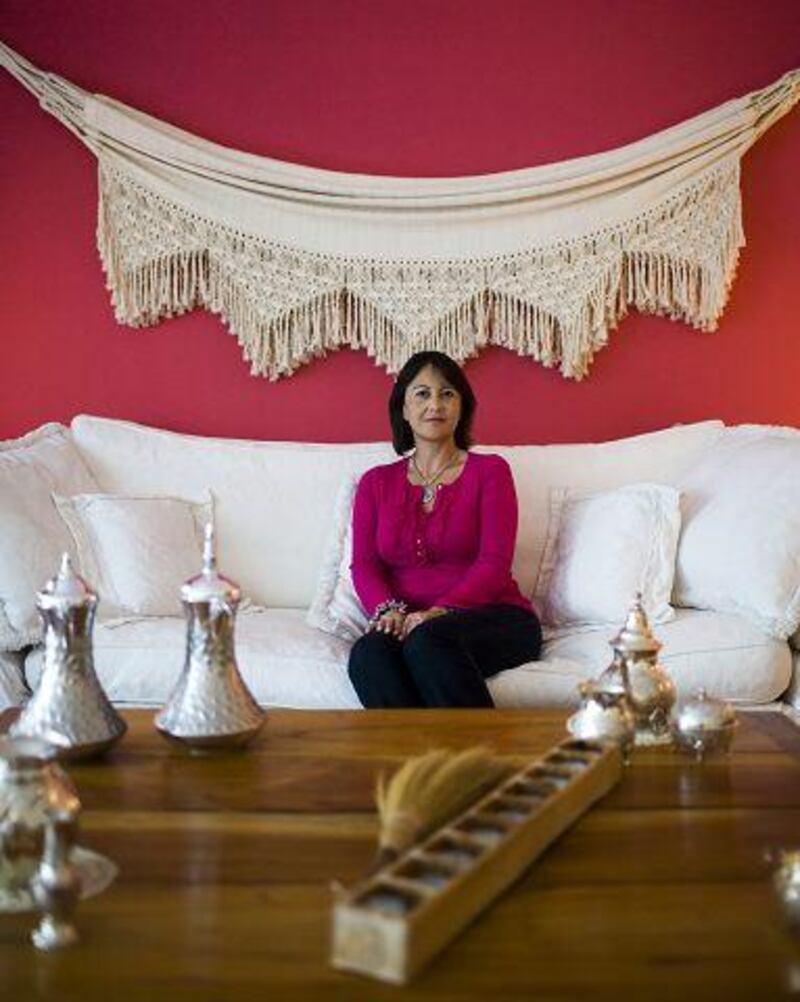ABU DHABI // Juanita Bell has spent the past two years campaigning tirelessly for the opening of a Colombian embassy in the UAE.
Early next year, it will happen. "I want to be able to look back and say I was there, helping," she said. There are more than 800 families from Colombia living in the Gulf, 500 of which are in the UAE. Their closest embassy is in Cairo, forcing them to travel there to replace lost passports, for example, or to register the birth of children. Mrs Bell, 42, plays down her role in the process, calling it a "true team effort" involving the Colombian community, its ministry of foreign affairs and UAE officials.
But it was from the front room of her Khalidiya villa - decorated with Columbus-era antiques, colonial furniture, Amazonian handicrafts and paintings by her fellow Colombians - that the seed was planted for what would become a major diplomatic coup for both the UAE and Colombia. "I started a band," she said. "But I was only playing the bongos, calling people to the party. All the important instruments, the decision makers, have come forward. Here I am, still playing the bongos. The Government have made the important moves."
But her own work cannot be underestimated. Since forming the Pro Colombia Group GCC, she has united the region's large Colombian community and works devotedly on her computer at home every day. In 2007, Mrs Bell and four friends drafted a petition to the Colombian government asking for official representation here. Within 20 days they had 80 letters. With the help of their website, www.colombia-arabia.com, the women began to rally Colombians in the region.
"Before this, I was enjoying coffee mornings with other mums here and taking tennis lessons like the typical expat wife," she said, "but I always wanted to be the best Colombian I could be abroad." It was not without a touch of luck that the process really took off. Specifically, it was the moment Mrs Bell spotted her country's then-minister of foreign affairs, Fernando Araujo Perdomo, from a burger bar in Bogota's El Dorado International Airport.
"I ran over to introduce myself," she said. "I thought it was my moment, and I had to take my chance." She was told to deliver the presentation to his deputy; by that October she had received a letter from the ministry stating that it understood the community's needs. A mobile consulate was then sent from Egypt in December to spend two days in Abu Dhabi and two in Dubai, trying to gauge the community's demands on the ground.
"There were too many problems to solve, too many Colombians to see in such a short time," she recalls. "It proved the extent of our needs." In September, the consul in Egypt, Rocio Guzman, came again. Mrs Guzman saw five people in Abu Dhabi whose babies had no papers. She saw many whose passports were up for renewal, and she registered a group of new Colombians in the country. These are the kinds of issues Mrs Bell has been dealing with on a daily basis since she launched the project, being the only person in the country the Colombians have to turn to.
"Once the embassy is here, I will hand all of this over to them and they will do a much better job," she said. More recently, a trade delegation focused on energy, tourism and agriculture, showed the commitment of the country, once riven with civil strife, to building relations with the UAE. In Mrs Bell's home, there is always the sound of Colombia playing in the background, and the kitchen smells of the morning's freshly baked arepas, the savoury Colombian pancakes.
Since moving to the UAE eight years ago, Mrs Bell, who was born in Bogotá, has seen a dramatic increase in the numbers of Colombians coming here. Many are working in the oil industry, one of Colombia's major sources of revenue, while many others are in the aviation, construction and education fields. There is, she said, a "great synergy" between Colombian and Arab culture. They share the same sense of community and family, making for a smooth transition from Latin America to the Gulf.
Colombia is a misunderstood country, Mrs Bell said. Much like the misconceptions relating to the Arab world, she said, the drug trade and kidnappings have tarnished Colombia's international reputation. The country features a large Arab community, especially Lebanese who came after the Spaniards left and are now flourishing. The Colombian government has now agreed to open an embassy in Abu Dhabi early next year.
"It has been a personal goal and challenge for me," Mrs Bell said. "But I've had over 700 families supporting me." @Email:mswan@thenational.ae






